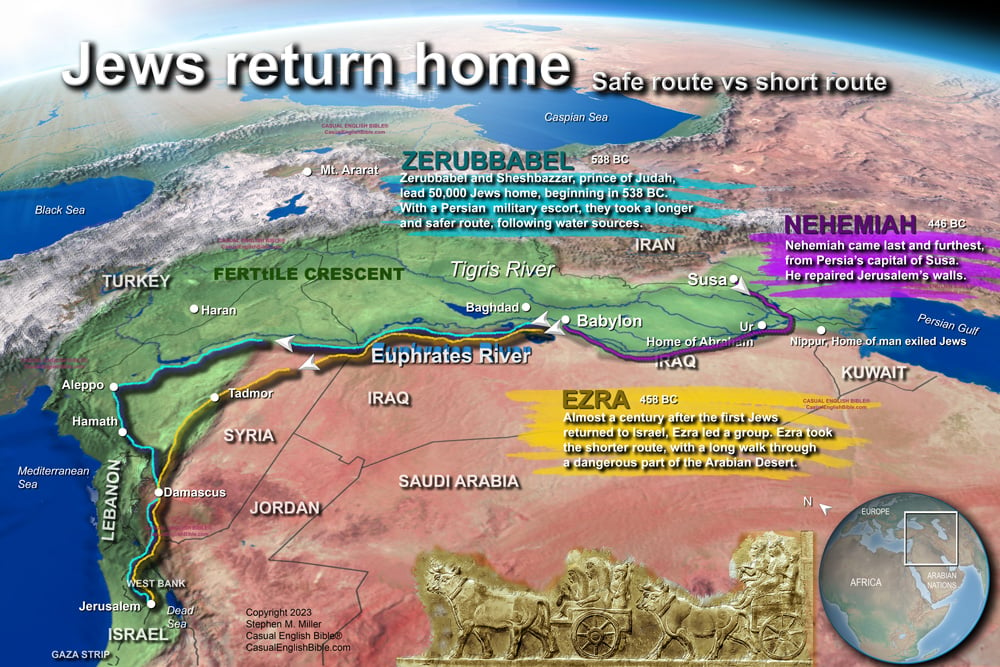Isaiah 52
Jerusalem’s shocking return
Dress for a party
1Wake up Jerusalem.
Put on your best clothes.
Celebrate, Holy City.
Dress like you’re royalty,
For Jerusalem is holy
And now off-limits to pagans. [1]
Shake off the dust.
Sit on your throne, Jerusalem.
Break those chains that held you.
You’re not captives anymore.
3The LORD has this to say:
You were sold for nothing—given away. [2]
You’ll be saved for nothing—released.
When Jerusalem died
4The LORD says this:
You moved to Egypt long ago,
And lived there as foreign immigrants.
Assyrians later attacked you
Though you did nothing to deserve it. [3]
Once again, invaders took my people captive, [4]
And led them into exile for no reason.
Those invaders mock your God.
They make fun of him every day.
6Soon enough my people will hear from me.
They’ll learn who I am.
They’ll know it’s me talking.
Beautiful messenger of peace
7How beautiful to see on the mountains
A messenger bringing news of peace.
Jerusalem is rescued, so spread the word:
“Your God reigns on his throne as King.”
Like a choir, they sing for joy.
For this is the day everyone sees
The LORD has come to Jerusalem.
9From these rocky ruins, sing for joy,
Shout for the rise of Jerusalem.
The LORD comforts his people
With news of Jerusalem’s rescue.
Muscles of God
10The LORD flexes his muscles
And the world sees it.
The LORD’s coming to the rescue
And the world will watch.
Don’t take sinful things with you.
Those who carry sacred Temple objects
First need to ritually purify [5]themselves.
12You won’t have to leave in a hurry.
No one will chase you away.
But the LORD will travel ahead of you
And Israel’s God will cover your back.
Israel’s shocking change
13My servant [6] will live a prosperous life
Of respect and honor and privilege.
Disfigured and marred,
He barely looked human.
He didn’t seem of this earth.
15He’ll shock the world again.
Kings will fall speechless
As they see what they never heard of
And think of what they never considered.
Footnotes
If we’re to take these poetic lyrics literally, some say, history didn’t work out that way. Babylon leveled Jerusalem in 586 BC. Rome did the same in AD 70. The similarities between the two attacks became so stark that Jewish writers after AD 70 starting calling Rome by the code name “Babylon.” That allowed them to diss the Roman Empire without Romans realizing it. Many scholars say a writer named John did that in the last book in the Bible, Revelation. There, “Babylon” is one of the book’s many code words.
God didn’t sell out the nation of Judah to the Babylonian invaders. God didn’t benefit from Judah’s lost war and the half-century of captivity in exile that followed. Judah sold themselves out, Bible writers say, by the sins they committed. They broke their agreement with God and suffered the consequences written into the contract (Deuteronomy 28:15-68).
Well, the Israelites might not have deserved what Assyrians did to them. But Israel did provoke the Assyrians. The northern Jewish nation of Israel joined a coalition of nations to resist the Assyrians, who were demanding money from nations, kingdoms, and tribes throughout what is now the Middle East. Assyrians won the war. In the process, they erased the northern Jewish nation of Israel from the political map (721 BC) and they pillaged the southern Jewish nation of Judah. A century and a half later, Babylonian invaders erased the southern Jewish nation of Judah (586 BC). Invaders exiled the Jews from their homeland each time. Jews from Israel did not seem to return as a large group. They became known as the Lost Tribes of Israel. But Jews from Judah began returning in the mid-500s BC to rebuild their nation.
This seems to refer to the Babylonian conquest and decimation of Judah and its capital of Jerusalem in 586 BC.
Initially, purification involved at least washing clothes and not having sexual intercourse (Exodus 19:15). Later, purification rituals included a waiting period, a ritual bath, and a sacrificial offering (Leviticus 15).
Scholars debate who the “servant” and the suffering person was—or were, if they were two people or groups. Many Christians say they see Jesus as the suffering servant in the passage that begins here and continues into chapter 53. But many Old Testament scholars argue for a connect to the era closer to Isaiah, who lived in the 700s BC. Some say the servant may have been Persian King Darius the Great (ruled 522-486 BC), who ordered that Jews be allowed to rebuild the Jerusalem Temple (Ezra 6:1-12). And some say the suffering person may have ben Zerubbabel, who led the first group of Jews back from Babylonian exile and became a leader among the Jerusalem Jews. Many Jewish scholars say the suffering servant was the people of Israel who had lived in exile as captives for 50 years.
Discussion Questions
- Sorry, there are currently no questions for this chapter.












